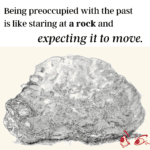
Preoccupation is a symptom of distress. It can’t also be the Solution.
26 May 2022
No One Knows Why They Did Anything
28 May 2022
Obsessing over trying to recover losses, being preoccupied with regret and cycling between fear and denial are far from ideal states.
Of course you know cognitively that what’s done is done and there’s no point in crying over spilt milk. Yet it’s easy to find yourself in the grip of these counterproductive feelings. It’s exhausting to focus on what cannot respond to your wishes, no matter how much energy you put into it – i.e. the past.
Past trauma or a decision that turned out badly leaves a lasting impression in your mind. Such a memory is too big to pass through our experience in the normal way, and so it gets stuck. While the rest of your mind is getting on with life, this bit gets stuck.
To this part of mind, the event is still happening. And that means it gets into action to try and change your history, to prevent these painful outcomes. Getting into action means producing emotion, and that is when the ‘if onlys’, the regret, the anger, the fear take hold of us.
You might say it’s just that you want to learn from what went wrong. This is valid and logical. But the lessons aren’t usually so complicated that they require weeks, months and even years of rumination.
Updating the whole mind (conscious and unconscious) can clear these troublesome states.
This requires some sophisticated techniques, but once your mind fully realises that an event is over, finished and nothing more needs to be done about it, it can relax.
Then we find that our focus shifts from regret onto opportunity. The energy that was caught up in the past is freed up and available to support us in moving forward.
This updating process is what we do in a Rapid Resolution Therapy session (The Institute for Rapid Resolution Therapy, Inc.). DM me if you’d like to find out more.
PS it took me 8 years of being stuck before I discovered how to get out of the quicksand.
PPS please note that the above is a schema for understanding what’s keeping people stuck and how to resolve it. Recalling memories involves much more of the brain than previously thought – so ‘parts’ are used as a metaphor here. My fave neuroscientist is Lisa Feldman Barrett.



